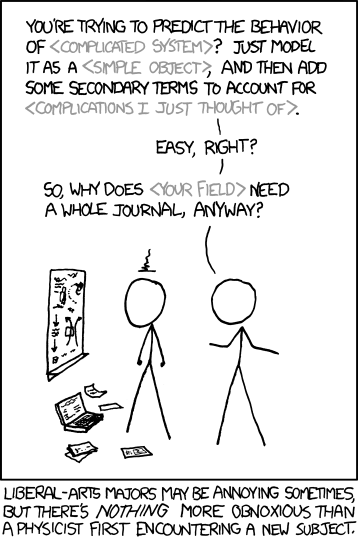Collins is discussing the fine tuning of the gravitational force relative to the electromagnetic force. Having argued for the life-allowing range of the gravitational constant, G, he goes on to attempt to determine the relevant comparison range of "allowable" values. He argues:
Given that the very idea of a constant of physics only makes sense within a set of laws of nature, and a set
of laws only make sense as instantiated in some universe, it makes no sense to talk about varying a constant
beyond its universe-permitting range. In other words, possible law structures can only exist if there is a
possible universe to instantiate them.
OK, let's suppose that's a reasonable approach. What then is the universe-permitting range of G values? Collins writes:
Although it is unclear exactly what the upperUm. There's so much wrong in this sentence that it's hard to know where to start.
bound of the "universe-permitting" strength of the gravitational force is, certainly if gravity were, for
example, a factor of 10^100 larger, a viable universe would be impossible: the gravitational attraction that a
single particle exerted on itself would result in a black-hole.
1) In neither Newton's nor Einstein's theory of gravity do we include the gravitational attraction that a
single particle exerts on itself in the calculation. We find instead the force that all other masses exert on our particle.
2) A single point particle, all by itself, is a black hole regardless of the strength of gravity.
3) A black hole solution is a valid possible universe in General Relativity. A bit later Collins writes:
Does our "black hole
universe" consisting of no-space time qualify [as a permissible universe]?
Sorry, but a black hole is not a solution consisting of "no space-time." It is exactly the opposite: a solution describing the space-time around a mass. And black hole solutions are possible no matter the value of G.
4) Expanding and re-contracting universes are possible regardless of the value of G. The right-hand side of Einstein's GR equations is G times the energy-momentum tensor. Thus, increasing G is the same as increasing the density of energy-momentum in the universe. Standard cosmological models (like the FLRW models) are still valid, no matter how large we make the density. Admittedly, the larger you make the density, the sooner the universe will re-collapse. But that's still a possible universe.
5) Empty universes, where the right-hand side of Einstein's equation is equal to zero, are still possible for any value of G. Collins asks whether empty universes count, but doesn't give any answer. He just ignores the issue. But it's clearly important for his project of determining the range of G that permits universes: if we include empty universes, then all possible values of G result in possible universes.
Collins seems to be a very smart guy, judging by the earlier parts of this paper. Yet he doesn't seem to have bothered to understand the physics he's employing before writing his article. Didn't he bother to check with an actual physicist? Or maybe he did, but got bad advice? (He doesn't acknowledge any assistance in the paper.)
At any rate, it seems it's not just us physicists who assume all other fields are easy.

No comments:
Post a Comment